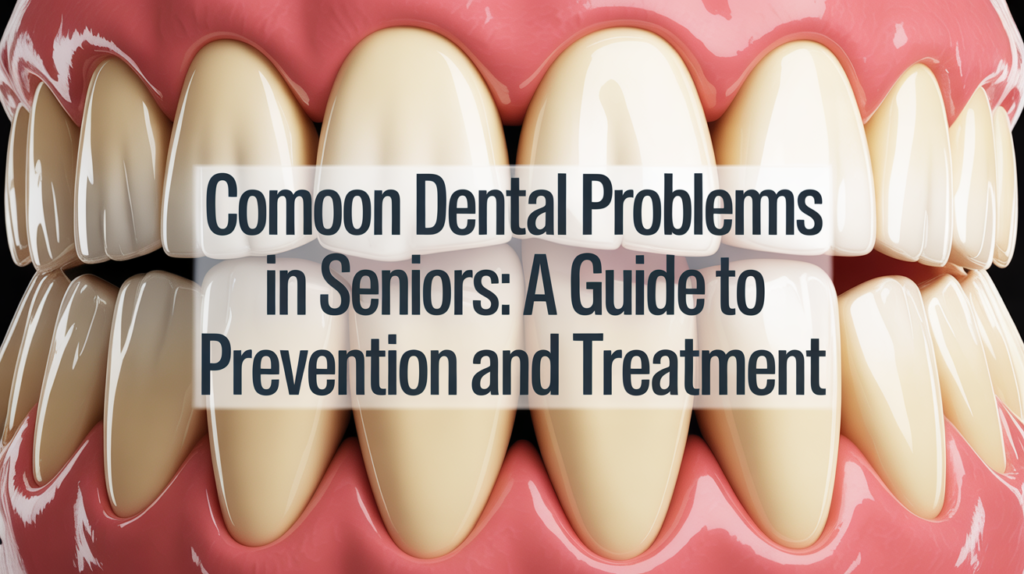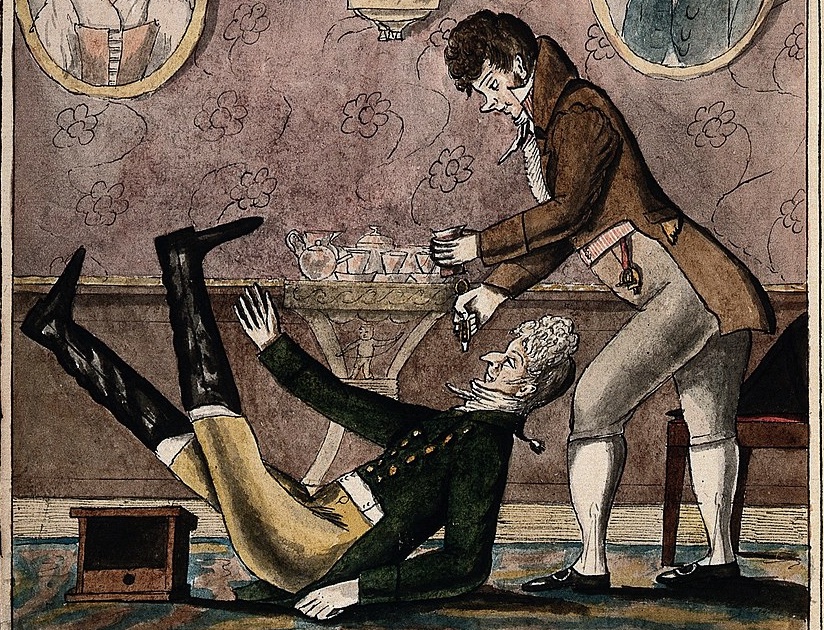Common Dental Problems in Seniors: A Guide to Prevention and Treatment
Introduction
As the population of seniors continues to grow, maintaining good oral health has become more important than ever. Aging brings unique challenges that can increase the risk of dental problems, making it essential for older adults to stay vigilant about their teeth and gums. Oral health isn’t just about having a bright smile; it plays a critical role in overall well-being. Poor dental health can lead to pain, difficulty eating, and even serious systemic conditions like heart disease. 😊
In this article, we’ll explore the most common dental issues faced by seniors and provide practical advice on how to prevent and treat them. Whether you’re a senior yourself or caring for an older loved one, this guide will equip you with the knowledge needed to maintain a healthy mouth as you age. Let’s dive into the details and uncover what makes dental care so vital for seniors.
The Most Common Dental Problems in Seniors
Seniors are more prone to certain dental issues due to aging and other contributing factors. Gum disease, tooth decay, and tooth loss top the list, but they aren’t the only concerns. Dry mouth (xerostomia), oral cancer, and denture-related problems also affect many older adults. These conditions often arise from a combination of factors, including poor oral hygiene habits, medication side effects, and chronic illnesses. 🦷
For example, gum disease affects nearly half of adults over 65, while tooth decay remains a persistent issue, especially around old fillings and crowns. Understanding these risks is the first step toward prevention. With proper care and regular checkups, many of these problems can be managed or avoided altogether. Next, let’s take a closer look at how aging itself impacts oral health.
The Impact of Age on Oral Health
Aging naturally changes the body, and the mouth is no exception. As we grow older, our gums may recede, exposing more of the tooth root to decay. Saliva production often decreases, leading to dry mouth-a condition that raises the risk of cavities and infections. Additionally, many seniors take medications that cause dry mouth as a side effect, compounding the problem. ⚕️
Chronic conditions like diabetes and arthritis can further complicate oral health. These diseases may make it harder to brush and floss effectively or slow down healing after dental procedures. Lifelong oral habits, whether good or bad, also play a role in determining the state of a senior’s dental health. Now that we’ve covered the broader impact of aging, let’s focus on one specific issue-gum disease-and its consequences.
“Fluoride therapy is effective for caries prevention . Frequent dental check-ups, professional tooth cleaning and patient education on oral hygiene instruction and dietary advice are also beneficial.” -PMC
Gum Disease and Its Consequences
Gum disease, which includes gingivitis and periodontitis, is alarmingly common among seniors. Early-stage gum disease, or gingivitis, causes redness, swelling, and bleeding of the gums. If left untreated, it can progress to periodontitis, a severe form that damages the bone supporting the teeth. This not only leads to tooth loss but also increases the risk of other health problems, such as heart disease and stroke. 🩺
“Gum disease is common in seniors, but it can be managed if caught early. Symptoms… include red, swollen, or bleeding gums.” -4th Street Family Dentistry
Seniors are particularly vulnerable because they may have decades of plaque buildup or pre-existing gum issues. The good news is that gum disease can be managed with proper care. Regular brushing, flossing, and professional cleanings can keep gums healthy. However, if symptoms persist, seeking treatment early is crucial. Up next, we’ll discuss another major concern for seniors: tooth decay and tooth loss.
“Tooth loss can provoke negative impacts on social status, self-esteem and oral health-related quality of life . In addition, a review reported that patients with tooth loss had an increased risk of having depression by 28% .” -PMC
Tooth Decay and Tooth Loss in Older Adults
Tooth decay doesn’t stop when we age-in fact, it can worsen. Root caries, or decay along the exposed roots of teeth, is especially problematic for seniors. Years of wear and tear, combined with receding gums, leave roots unprotected against bacteria. Old fillings and crowns can also develop cracks or gaps, creating hiding spots for decay-causing germs. 😬
“Dry mouth is a common issue for seniors, but staying hydrated can help keep your mouth moist. Drinking water… using sugar-free gum or mints… consult your dentist to explore other options.” -4th Street Family Dentistry
Tooth loss is both a cause and consequence of poor oral health. Missing teeth can make chewing difficult, leading to nutritional deficiencies, and may even contribute to cognitive decline over time. Fortunately, modern dentistry offers solutions to replace lost teeth and restore confidence. But prevention remains key. In the next section, we’ll explore how dry mouth exacerbates these issues and what can be done about it.
“Your risk of getting oral cancer goes up as you get older. If you see any changes in your mouth, it’s important to get them checked out.” -MyHealthfinder
Dry Mouth and Medication-Induced Dental Problems
Dry mouth, or xerostomia, is a frequent complaint among seniors, often caused by medications used to treat high blood pressure, depression, and other conditions. Without enough saliva to wash away food particles and neutralize acids, the risk of cavities and oral infections skyrockets. Many seniors also find dry mouth uncomfortable, making it hard to talk, eat, or swallow. 💧
“If you have dentures, a bridge, or dental implants, be sure to clean them, too. Your dentist can tell you how.” -MyHealthfinder
Luckily, there are ways to combat dry mouth. Staying hydrated, using sugar-free gum or lozenges, and avoiding caffeine can help stimulate saliva flow. For persistent cases, consulting a dentist or doctor might be necessary to explore prescription treatments. Moving forward, let’s examine another serious concern: oral cancer and its warning signs.
“Brushing your teeth at least twice a day and flossing once a day are fundamental habits that help remove food particles and plaque… use a soft-bristled toothbrush and fluoride toothpaste to prevent gum irritation.” -4th Street Family Dentistry
Oral Cancer Risks and Warning Signs
The risk of oral cancer rises significantly with age, particularly for those who smoke or consume alcohol heavily. Early detection is crucial for successful treatment, yet many seniors overlook subtle signs like sores that don’t heal, white or red patches, or unexplained numbness in the mouth. 🔍
“Prevention is always better than treatment, and this principle holds true especially for seniors… Professional cleanings and fluoride treatments that reduce the risk of cavities.” -Spring Valley Dental
Regular dental checkups are vital for spotting these warning signs before they escalate. Self-examinations at home can also help catch abnormalities early. If anything seems unusual, don’t hesitate to contact a healthcare provider. With timely intervention, oral cancer can often be treated effectively. Next, we’ll shift our focus to caring for dentures and implants.
“Tooth loss resulted in edentulism or lack of functional dentition affects nutritional intake and poses an increased risk of malnutrition by 21% .” -PMC
Denture Care and Implant Maintenance
For seniors relying on full or partial dentures, proper care is essential to avoid discomfort and infections. Ill-fitting dentures can cause sore spots, while poor hygiene may lead to fungal infections like thrush. Cleaning dentures daily with non-abrasive products and soaking them overnight helps maintain their longevity. 🪥
“Sedation dentistry options for patients who may feel nervous or have trouble sitting comfortably.” -Spring Valley Dental
Those with dental implants or bridges must also prioritize cleanliness. Specialized tools, like interdental brushes, can reach tricky areas around prosthetics. Regular dental visits ensure that dentures fit properly and that implants remain secure. Now, let’s discuss how seniors can maintain excellent oral hygiene at home.
“It’s especially important to take care of your teeth and gums if you have a health condition like diabetes or heart disease – or if you’re taking medicines that can cause oral health problems.” -MyHealthfinder
At-Home Oral Hygiene for Seniors
Maintaining oral hygiene at home becomes even more important as we age. Brushing twice daily with fluoride toothpaste and a soft-bristled brush is a must. Flossing-or using alternatives like water flossers-helps remove debris between teeth. For seniors with limited dexterity, electric toothbrushes and floss holders simplify the process. 👵
Selecting the right products matters too. Alcohol-free mouthwashes and moisturizing gels can soothe dry mouths, while fluoride rinses strengthen enamel. Establishing a consistent routine ensures that seniors protect their teeth and gums every day. Speaking of protection, let’s highlight why regular dental checkups are indispensable.
Importance of Regular Dental Checkups
Even if no immediate issues seem apparent, regular dental visits are crucial for seniors. These appointments allow dentists to catch problems early, such as cavities, gum disease, or oral cancer, before they worsen. Professional cleanings remove stubborn plaque and tartar that at-home brushing can’t tackle. 😌
Beyond cleaning, screenings for oral cancer and evaluations of existing restorations are standard during checkups. Dentists can also offer personalized advice based on individual needs. By staying proactive, seniors can enjoy healthier smiles for years to come. Before wrapping up, let’s touch on how nutrition and lifestyle choices influence oral health.
Prevention: Nutrition and Lifestyle Choices
A balanced diet rich in vitamins and minerals supports strong teeth and gums. Limiting sugary snacks and beverages reduces the risk of cavities, while crunchy fruits and vegetables promote saliva production. Staying hydrated is equally important, especially for combating dry mouth. 🥗
Avoiding tobacco and excessive alcohol not only benefits general health but also lowers the risk of oral cancer and gum disease. Small lifestyle changes can make a big difference in preserving oral health. Finally, let’s review treatment options available for seniors facing dental challenges.
Treatment Options for Senior Dental Problems
Non-Invasive and Preventive Treatments
Preventive treatments like fluoride applications and sealants are highly effective for seniors. Regular cleanings and patient education empower individuals to manage their oral health better. Products like high-dose fluoride toothpaste or silver diamine fluoride (SDF) can arrest early-stage cavities without invasive procedures. ✨
Restorative and Surgical Solutions
When prevention isn’t enough, restorative options come into play. Dentures, implants, and bridges replace missing teeth, restoring function and aesthetics. Advanced cases of gum disease may require period Ontological therapy or surgery to save affected tissues. Modern dentistry provides numerous solutions tailored to seniors’ unique needs.
Overcoming Barriers to Dental Care for Seniors
Data



